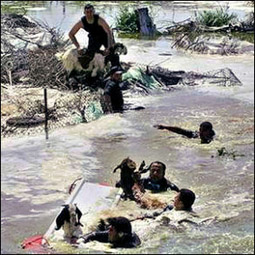
Gaza’s Tsunami
By Ahmed Abdullah
March 30th 2007
It’s been reported that at least five Palestinians, including two toddlers, were drowned in a “sewage Tsunami” that hit Gaza strip after a water treatment reservoir burst. The incident destroyed Umm Naser, a village in the northern section of the coastal Strip.
The sad event coincided with the announcement that the Palestinian President Mahmoud Abbas and Israeli Prime Minister Ehud Olmert would have a bi-weekly meeting that will be coordinated with the U.S. government.
Despite claiming, as she usually does in almost all of her previous visits to the Middle East, that her mission’s goal is to revive the deadlocked peace process, the U.S. Secretary of State Condoleezza Rice, demonstrated once again the unwillingness of Washington to engage in any credible initiative aimed at bringing real peace to the region. Rice delivered Bush’s message of rejecting the democratically elected Hamas, branded by the U.S. as a terrorist organisation for its armed struggle against the Israeli occupation.
Some may find difficulty linking the meaningless political intercourse to the destructive sewage tsunami that hit Palestine- but the two reflect the extent of misery facing the Palestinian population on one hand, and the Western powers’ failure to show humanist or ethical commitment to the Palestinian crisis on the other.
This prevailing negligence towards the occupied and poor nation of Palestine, which has been struggling to secure its liberation from the Israeli occupation for decades, and whose sufferings intensified thanks to the West’s decision to starve the people and cut yearly aid sent to the government, is indeed reflected in the two sad realities Palestinians currently face.
In a new sign of the West’s hypocrisy, Rice appealed to Arab states to “participate actively in the peace process”, but at the same time rejected the Palestinians’ decision and will that was reflected in Hamas’ rise to power.
Rice showed fake care for the Palestinians’ wellbeing by hailing the Saudi summit describing it as “an example of such new thinking.” But she insists on turning a blind eye to the starvation Palestinians suffer as a result of the U.S.-led Western aid embargo, used as a punishment against the Palestinian people for contradicting the will of Washington.
That was further made manifest in a recently released report by the House of Commons International Development Committee, in which it painted a bleak image of the situation of the Palestinians following a visit to the territories.
It condemned the economic sanctions imposed against the Hamas government of the Palestinian Authority (PA) by the United States and the other major powers, including Britain, and denounced the actions of Europe and the United Nations as well as Israel’s occupation of the West Bank and Gaza and its brutal suppression of the Palestinian people.
Among the report’s findings:
1- Palestinian GDP declined by 9 percent in the first half of 2006 and was predicted to fall by 27 percent by the end of 2006, with personal income falling by 30 percent.
2- Over 160,000 public sector workers didn’t receive their salaries since March 2006, which had its bad impact on 25 percent of the population.
3- Palestinians now are forced to postpone paying bills (83.5 percent), use past savings (26.3 percent), sell women’s jewellery (29.6 percent) and reduce consumption of fresh meat (88.6 percent).
4 – 70 percent of Gaza workforce is either unemployed or not getting paid.
5 – 51 percent of the Palestinians now depend on food assistance.
6 – Malnutrition rates among Palestinians are now as bad as parts of sub-Saharan Africa.
7- Infant mortality has reached 25.2 per 1,000 live births, while under-five mortality is 29.1 per 1,000 live births.
8- As a result of being unable to pay hospital fees and the closures imposed by Israel, unemployment and block of salaries, the supply of medication and equipment gets interrupted.
9 – 25 percent of Gazans are denied sufficient access to water.
10- Only 7.3 percent of West Bank land is irrigated, whereas 50 percent of Israeli lands are regularly irrigated.
11- Real per capita consumption fell by 12 percent in 2006, with food consumption down by 8 percent.
Palestinians are facing an unprecedented humanitarian and political crisis.
Article Source: Aljazeera.com



